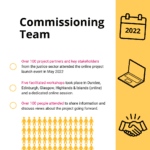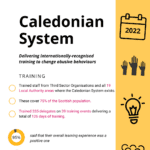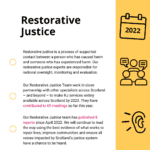National Event: How small steps fuel bold change
Does justice need gradual change or a giant leap? A FREE in-person event for visionaries, rabble-rousers, optimists & all those in-between
- How small steps fuel bold change
- Professor Jason Leitch, Dr Aubrey Fox, Karyn McCluskey and James Docherty
- Tuesday 3rd October
- Dynamic Earth, Edinburgh
- FREE to all
Drawing on the knowledge of expert keynote speakers: Professor Jason Leitch, Dr Aubrey Fox, Karyn McCluskey and James Docherty ‘How small steps fuel bold change’ will inspire you to think about how to implement change.
We pose the question: do we need big, bold and radical change? Or, incremental change across time. What works? And, why failing spectacularly isn’t always a bad thing. It is a serious and honest debate about the need for change – with practical takeaways on how you can approach problem-solving in your own work, or personal life.
Over the course of the morning, our speakers will share examples of their work in justice, prevention and public health – from Scotland and around the world – and show how ideas, whether bold or gradual, can gain traction.
At a time where Scotland has one of the highest imprisonment rates in Western Europe, 28.8% of Scotland’s prison population are on remand* and more than £442 million is spent every year on Scottish prisons, this debate couldn’t be more timely.
So, tell us – what does success look like to you? What do you want to see accomplished in Scotland?
For us, here at Community Justice Scotland, that’s a justice system that puts community at its heart. Supporting people to stay in, reconnect and contribute to their communities and putting #CommunityFirst, every time.
*(compared to 19 per cent only five years ago)

Restorative Justice Action Plan Quarterly Report: March – June 2023
Information on the progress of the Restorative Justice Action Plan and its outcomes in the reporting period of March – June 2023
Restorative Justice Action Plan Quarterly Report: January–March 2023
Information on the progress of the Restorative Justice Action Plan and its outcomes in the reporting period of January–March 2023
OUTCOME ACTIVITY ANNUAL REPORT 2021-22
People working in the justice system had to innovate to help those in need as communities and public services continued to face challenges during the pandemic, according to a new report.
The Outcome Activity Annual Report published today (31 March 2023) captures the national activity contributing to community justice outcomes between April 2021 and March 2022.
Richard Thomson, lead author, explained: “The pandemic continued to affect people and services. Nonetheless, local partners were able to innovate and deliver to those most in need.
“Going forward the revised National Strategy for Community Justice sets out ambitions for our partners and communities to work together to improve outcomes for individuals.”
Draft Corporate Plan 2023/24 – for Consultation
This corporate plan covers the draft vision, priorities, and strategic direction of CJS for the period 2023-2026. The draft document and the survey is for all partners and stakeholders to consider and provide comment. The consultation period is open for six weeks and will close on the 28th of April 2023.
The corporate plan is available to read here: Corporate Plan
The consultation survey can be completed here: Consultation Survey
Restorative Justice Action Plan Quarterly Report: October – December 2022
Information on the progress of the Restorative Justice Action Plan and its outcomes in the reporting period of October – December 2022.
Restorative Justice Action Plan Quarterly Report: July-Sept 2022
Information on the progress of the Restorative Justice Action Plan and its outcomes in the reporting period of July – September 2022.
Working together to improve the lives of the people of Scotland
From training and improvement to people, policy and communications, our expert teams work relentlessly to improve the lives of the people of Scotland.
Every team at Community Justice Scotland (CJS) plays a vital role in helping to deliver organisational aims; including the delivery of the Scottish Government’s National Strategy for Community Justice.
We’ve created these infographics to proudly highlight just a few of the achievements by CJS staff so far in 2022.
Click thumbnails below to enlarge:

Workshops: The Future of Throughcare and Mentoring
What makes for the best support for people leaving prison? Join one of these short workshops to help shape the future of voluntary throughcare in Scotland.
Community Justice Scotland is collaborating with Scottish Government to review throughcare and mentoring services across Scotland for people who are leaving prison after serving short term sentences of up to four years.
The purpose of this review is to understand what good looks like in the provision of voluntary throughcare and mentoring services in Scotland and set up a commissioning approach and service design that will create the conditions for a consistent, effective, high quality, national response for people leaving prison.
Facilitated by Iriss, these half-day workshops aim to bring together those with an interest in developing the best possible support for people leaving prison to:
— Develop and discuss new ideas and approaches to voluntary throughcare and the wider system
— Contribute to, and shape the CJS/SG review
Find out more and book via the links below
- Highlands & Islands (online) Eventbrite link / 23 August 2022
- Dundee Eventbrite link / 30 August 2022
- Glasgow Eventbrite link / 6 September 2022
- Edinburgh Eventbrite link / 7 September 2022
- Online Eventbrite link / 13 September 2022
All in-person workshops will be held at city centre venues – details TBC.
Communities across Scotland given a boost
Children’s play areas have been brightened up and pathways cleared across Scotland by people carrying out sentences in the community.
Despite the challenges of a global pandemic around 300,000 hours of unpaid work have been done across Scotland in a year by people completing community payback orders (CPOs).
The information is included in the annual CPO report for 2020-21, produced by Community Justice Scotland, the national body responsible for reducing reoffending.
The report also shows how social workers supervised and supported people dealing with mental health and substance misuse with their recovery through CPOs.
It also highlights significant challenges faced during the pandemic throughout 2020-21. Unpaid work continued where possible but adjustments had to be made to keep people and communities safe.
Projects completed included helping brighten up children’s play areas, supporting foodbanks, maintaining open spaces, providing community support and environmental projects.
Innovative solutions helped some people complete unpaid work hours during the pandemic and manage other CPO requirements issued by the court to keep communities safe and reduce further offending.
Community justice is where people who have broken the law are held to account and supported to reconnect and contribute to their communities.
Where it is safe to do so, people who commit certain crimes receive community-based sentences. These can include treatment for underlying issues such as drug or alcohol addiction, unpaid work, fines and compensation or restrictions of liberty such as electronic tagging and curfews.
The evidence shows community justice can help people stop breaking the law again leading to fewer victims and safer communities.
CPOs are designed to make Scotland safer by supervising and supporting people to improve the way they live in their own community.
Richard Thomson, report author and improvement lead from Community Justice Scotland, said: “The pandemic has been a unique challenge over the past year for everyone. But where possible community payback orders, which include unpaid work have continued in communities across Scotland.
“Services have found innovative solutions to help people fulfil some of their unpaid work hours and other activities required from outside projects to home working and online learning.
“Community sentences allow people to repay harm caused and address any underlying issues which led to them offending such as mental health, drug and alcohol problems.
“Due to restrictions and lockdowns, services have had to adapt and find ways to support people to complete unpaid hours safely.
“The evidence shows that sentences served in the community are more effective than a short prison term in reducing reoffending. This means fewer victims of crime and a safer Scotland for all.”
>>Download the report here





